
 |
|
|
|
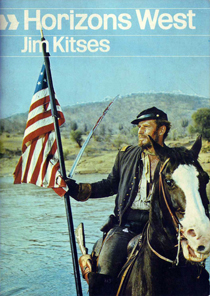
Although praised highly by film critics, director Budd Boetticher has never been a household name. Jim Kitses' early auteur study Horizons West captured the essence of Boetticher's unique approach to westerns, contrasting it with that of his contemporaries Anthony Mann and Sam Peckinpah. It's still the most illuminating book I've read on the American western. Sony's five-disc The Films of Budd Boetticher set is as obscure a marketing title as can be imagined, but it chooses the right name to honor. The five medium-scale westerns contained inside all star Randolph Scott and were made between 1957 and 1960. They're called the "Ranown Cycle", a name made by combining RANdolph Scott with producer Harry Joe BrOWN. Critically speaking, the cycle includes one title (Seven Men from Now) and excludes another (Westbound), both of which were produced outside of Columbia. The movies have small, sometimes tiny casts and no big stars other than the reliable box office draw Scott. They benefit from expressive color cinematography in interesting locations by ace cameramen like Burnett Guffey and Lucien Ballard. But the real praise goes to the writing and direction. Boetticher presents his little dramas more forcefully than do many epics, and he uses the building blocks of the western genre in very interesting ways. Boetticher's Randolph Scott westerns play interesting games with the concept of the hero and the villain. Some of the bad guys are quite sympathetic and some of Scott's "heroes" rather inflexible, even downright hostile. Burt Kennedy scripts three of the films but all have a winking sense of humor at some level. In keeping with genre demands, a steady supply of gunplay is offered, all in the service of the story. 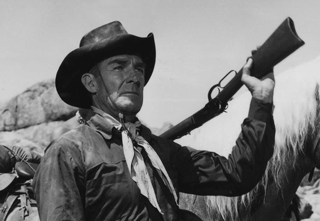
In every one of the films, the Scott character is mirrored by a darker gunfighter, not necessarily an outright outlaw villain. Most of the tension is derived from dramatic interchanges in which the two men evaluate one another and debate their conflicting philosophies, even if only obliquely. Critic Andrew Sarris called the movies "floating poker games" in which Scott's hero and the colorful villain test one another for weaknesses. That strategy and the arena-like stages for the final conflict are often correlated with director Boetticher's great love for bullfighting. The villains tend to be talkative and likeable; more often than not they secretly yearn for the same peace and security that the hero seeks. These are indeed formalistic westerns: you'll note that everyone follows a personal code, and that the code forms an understanding between adversaries that doesn't need to be explained. Scott, for instance, won't shoot anyone in the back, no matter what. Randolph Scott's character often keeps his mouth shut, even when the heroines impugn false motives to his actions. Action determines character, and Scott's westerners remain true to their personal natures.
The Tall T starts as almost a comedy before settling into a violent standoff. Brennan (Scott) is held with the honeymooning Mimses (Maureen O'Sullivan and John Hubbard) by road agent Usher (Richard Boone) and his young helpers Henry Silva and Skip Homeier. The new husband turns out to be more than willing to leave his wife to die; Brennan and Doretta Mims band together to separate and defeat the outlaws. The murder of some innocents makes for a grim change of tone, and a shotgun killing is particularly intense. From an original story by Elmore Leonard. 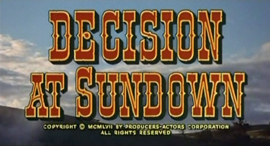
In Decision at Sundown Bart Allison (Scott) and his friend Sam (Noah Beery Jr.) come to town to kill the rich Tate Kimbrough (John Carroll), who Bart holds responsible for the death of his wife. It's Kimbrough's wedding day, and Allison coldly informs the bride Lucy Summerton (Karen Steele) that she'll be a widow by sundown. A standoff in the streets ensues, which becomes more complicated when Kimbrough's mistress Ruby James (Valerie French) gets involved. In this one Scott's not only a murderous threat, he's entirely wrong -- one can easily imagine the same story with the Bart Allison character played as a stock villain. The leather jacket Scott wears in this film is either the same one he uses in Ride the High Country, or a close copy. 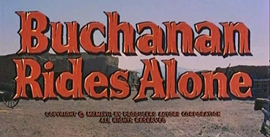
The amusing Buchanan Rides Alone is the closest Ranown film to a comedy. Just like Clint Eastwood in Fistful of Dollars, Loner Buchanan arrives in corrupt Agry Town and runs afoul of the local law. The promise of a ransom for another prisoner, young Juan de la Vega (Manuel Rojas) is enough to divide the members of the Agry family and pit them against one another. Deputy Pecos (L.Q. Jones) switches loyalties to help Buchanan and Juan, setting the stage for a cross-border skirmish. Standing off to one side of the slaughter is Agry's hired gunfighter Carbo (Craig Stevens), an equally cool customer who takes an immediate liking to Buchanan. The film starts with a fine off-color joke: Buchanan calls Agry Town a place where everything seems to cost $10, and then does a double-take at a bar girl. Randolph Scott wears a curious too-small hat in this one, perhaps to fit with his essentially humorous character. 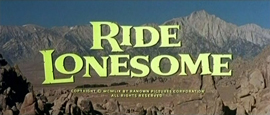
Boetticher graduates to CinemaScope with Ride Lonesome, perhaps the most compact and formally perfect of the series. Brigade (Scott) is taking outlaw Billy John (James Best) to town. For personal reasons, he wants Billy's murderous brother Frank (Lee Van Cleef) to catch up with him. Along the way Brigade meets newly widowed Carrie (Karen Steele) and a pair of less-dangerous outlaws, Sam Boone (Pernell Roberts) and his sidekick (James Coburn, in his first feature). Whoever brings in Billy will be granted amnesty. Boone very badly wants to use Billy to clear his record, but Brigade refuses to cooperate. With the threat of Indian attacks, the tension comes from within and without. The scenery and action are spare. Boetticher reserves his strongest compositions for the stark hanging tree waiting at the end of the trail. 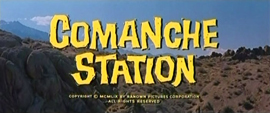
Comanche Station is the most wistful of the films. Like a ghost of the desert, Cody (Scott) has searched ten years for his wife kidnapped by the Indians. He buys a white captive sight unseen, not knowing that she's Mrs. Lowe (Nancy Gates), gone missing fairly recently. They are joined by outlaw Ben Lane (Claude Akins) and his sidekicks (Richard Rust and Skip Homeier). Lane wants to reap the reward for Mrs. Lowe's return, and is willing to kill for it. Mrs. Lowe wrongly assumes that Cody had a mercenary motives in her rescue, while both Cody and Lane wonder what kind of unworthy husband would hire others to bring back his wife. Cody clearly wishes that Mrs. Lowe might end his own loneliness, but he doesn't let on. I recommend not seeing this final picture right after Ride Lonesome as it utilizes almost all the same locations. Oddly, Comanche Station seems to end in the same place that it started, among the rocks of Lone Pine's Alabama Hills. Even more oddly, the hanging tree seen in Ride Lonesome returns for one shot, in the middle of a flooded area. Could it really be in the same place, but at a different time of year? As both of these last films were made on the same contract with Columbia, it's possible that they were shot very close to one another, and released a year apart. All of the films save one are have strong ideas about how men relate to women. In The Tall T Brennan forcibly kisses Doretta Mims to make her stand up and fight for herself. Bart Allison in Decision at Sundown is in denial about his wife's true nature, and is impressed by another woman's commitment to her man. Brigade in Ride Lonesome shows tenderness to Carrie but is too consumed by vengeance to respond to her overtures. And Cody in Comanche Station, refusing to give up hope for his lost wife, underestimates the relationship of the married woman he brings back from captivity. Boetticher's westerns display traditional genre values. The Indians are a generic threat to provide action scenes. The Indians in Comanche Station are fairly ridiculous, wearing loincloths in the scorching desert and outfitted in obvious rubber skullcaps with Eastern-style Mohawk hairstyles. Yet none are demeaned with disrespectful parts. The same goes for the Mexican characters in Buchanan Rides Alone, who exhibit a sense of honor completely alien to Agry Town. This might be expected given Boetticher's career as a bullfighter in Mexico. The sight of the rational, principled Mexicans watching the greedy Gringos blow each other's brains out is a pretty accurate image of America's standing on the international scene. The five movies are superficially similar yet very different. They're all little moral stories, each effective in its own way. The mirrored hero & villain are not the "binary" opposites seen in the films of Anthony Mann and Sam Peckinpah; they don't combine to form a complete personality, as might the main characters of Ride the High Country or Bend of the River. The villain invariably recognizes the superior moral position of the Scott character, and tries to charm his way into Scott's good graces. All of the films are good, solid western adventures. With his chiseled face and graceful presence Randolph Scott is a pleasure to watch. And nobody rides a horse like Randolph Scott. After Comanche Station Scott would do one more western before retiring, the beautiful Ride the High Country for Sam Peckinpah. In a way, High Country is an elaborate riff on the Boetticher canon, but with two old westerners instead of one. It's a great movie to go out on.
The Films of Budd Boetticher set comes in an attractive folding disc holder decorated with well-chosen photos, including an image of the director as a bullfighter. Each title is on a separate disc. The video quality is exemplary throughout. Columbia has restored the films and carefully color-matched the scenes. Even day-for-night scenes are appropriately timed. The film grain is higher in title sequences and during dissolves, and we can often see the
Sony's DVD producer has tried to maximize what was clearly a small budget. Three of the pictures have short monologues by Martin Scorsese, Taylor Hackford and Clint Eastwood. Scorsese gets caught up in the bullfighting metaphor, making an unclear reference to "little movements" that have great meaning. Hackford makes a flawed comparison between Decision at Sundown and High Noon, where the townspeople definitely did not turn out to back up the lone hero. A picture of Valerie French is mistakenly shown when Hackford is talking about Karen Steele, but in general the featurettes are pleasingly edited. Clint Eastwood's thoughts about Comanche Station are casual and pleasant. These featurettes shouldn't be seen before the movies, because they're full of spoilers. I enjoyed the set's three audio commentaries. Jeanine Basinger is consistently listenable, and her talk on The Tall T analyzes the film from multiple points of view. Jeremy Arnold provides an entertaining commentary for Ride Lonesome, sharing excerpts and observations from his own interviews with Budd Boetticher. Taylor Hackford, an old associate of the director, narrates Comanche Station but offers a more generalized track. All the narrators stress that Boetticher turned out each of these polished films in only two weeks or so ... not much longer than a Roger Corman production. The film must have been tightly scheduled, but very few flaws stand out. Opposite angles in the climactic shootout of Buchanan Rides Alone are taken at radically different times of the day. A young actor murdered near the end of Comanche Station suddenly sports a big bullet hole in the back of his red shirt -- before he's shot. Each film is represented by an original trailer, most of which are in great shape. The disc menus are rather "rinky-dink", as a friend described them, but are serviceable enough. Too bad they weren't coordinated with the set's excellent packaging design. The Film Foundation, an entity involved in film preservation, is given a credit on the package, but its exact role is nowhere explained. The main set extra is the docu A Man Can Do That, produced for Turner Classic Movies. It's on The Tall T but one must access the special features menu to find that out. It's an excellent telling of Boetticher's life story and career with good clips from many films, and plenty of interview footage with the director at several stages of his forced retirement. Boetticher comes off as an exceedingly nice guy, one of those people we instantly admire. At one point he talks about using a helicopter to find "unused" locations. When Boetticher put down a stake to mark his chosen camera position, he discovered than another cameraman's stake was already there, left over from a Raoul Walsh movie from twenty years before! Clint Eastwood and Quentin Tarantino serve as partial hosts and a narration is provided by Dave Kehr and read by Ed Harris. The one drawback is that the clips from the Ranown pictures are heavily laden with spoilers; again, making this yet another extra to avoid until one has seen the movies.
On a scale of Excellent, Good, Fair, and Poor,
The Films of Budd Boetticher rates:
Reviews on the Savant main site have additional credits information and are more likely to be updated and annotated with reader input and graphics.
Review Staff | About DVD Talk | Newsletter Subscribe | Join DVD Talk Forum |
| ||||||||||||||||||